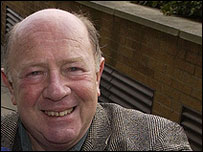 This Is Not A
BLOG!
This Is Not A
BLOG!
Date: 19/10/07
A Master Departs

Alan Coren
Humourist and broadcaster
b. 27 June 1938 d. 18 October 2007
Humourous writing is a difficult enough business. My own feeble muse operates fitfully at best, so I reserve much of my admiration for those who can turn humourous material out on a regular basis and maintain a high quality over a long period of time. In this, Alan Coren was my hero.
Coren had been at it for about fifteen years by the time I first encountered him in a compendium of humourous material published in 1976 (when I was 14). I suppose it was my first real encounter with grown-up humour on the printed page (although I had been 'softened up' by exposure to the likes of Dave Allen and The Goodies on television long before that). There was something there. I wasn't sure what exactly it was (and may not be sure even now): the ability to turn the familiar into the strange and wonderful in order to show us its (and our) absurdity; the talent to grasp the epitome of a character type; the wit to play with language and subvert cliché; the ambience of not just the urbane but the suburban (which dovetailed neatly with my other main humourous reading at the time, Alex Graham's Fred Basset strip).
Of course, I wouldn't have been thinking in these terms at 14; I just knew that here was material which was amusing and well-written.
Then I found out that this man had written actual books of this stuff! Well, OK, the books were collections of pieces which had originally featured in magazines, but I just had to sample his writing at greater length. I think I was 16 when I bought my first Alan Coren book - the paperback of his 1974 collection The Sanity Inspector. Then I really was hooked as I read pieces such as What Every Schoolboy Knows, which shows what could happen when primary school sex education goes critical; Some Day My Prince Will Crawl which gives the feminist versions of some well-known fairy tales; and Believe Me, in which TV magnate Lew Grade becomes Pope.
Buying more of his books was, alas, out of the question at that time, but I was fortunate in that the library of the college I was attending had a subscription to Punch, which Coren was now editing. So I had fortnightly access not only to Coren (who, not content with just editing the magazine, also contributed a piece to nearly every issue), but to the other writers he was publishing: Basil Boothroyd, Miles Kington, Paul Jennings and George Melly amongst many more (and that's not including the famous Punch cartoons). I supplemented this treasure trove by borrowing his other books from the town library.
After about 1982, lack of money, lack of opportunity and my own changing view of the world meant that I became more distant from Alan Coren, although I did see him on television occasionally (including one of his rare mis-steps, when he took the job of chairman of a mercifully short-lived TV version of Scrabble™), and heard him as a regular on BBC Radio 4's The News Quiz.
It was the late 1990s when I next started reading him. With some trepidation, I ordered a couple of collections of his most recent columns from The Times (where he had fetched up after leaving Punch and following a brief spell at The Listener). Was he still capable of amusing me? Could he still put me in awe of his way with words and ideas?
Thankfully, he could. Although much of his later writing revolved around his life in the semi-mythical suburb of Cricklewood, there was nothing leadenly suburban about it; the flights of fancy could still take wing; the dagger thrust still found its mark.
For Coren could be ascerbic: I well remember a long piece he wrote about visiting Disneyworld, which climaxed in his description of the parade held daily in that saccharine nightmare world. After remarking how thoroughgoingly white the parade was, he recalled that there were two black men standing behind him, one of whom called out, "Hey, man, what time's da lynchin'?"
He could hit you between the eyes with profundity, too. In a piece included in The Sanity Inspector, entitled Good God, That's Never The Time, Is It?, he ruminates on becoming thirty five. This was a significant moment because it represented the halfway point of the old 'three score years and ten' which, he said, was the only remnant of formal religious belief he still carried.
It's a funny piece, partly because it also refers to the effects on a man of having to get up in the night to feed his infant daughter (now the columnist Victoria Coren); but it is shot through with a profound melancholy, one which chimed with how I felt (and how I still feel) about the passing of our years. And then he provides us with what he called 'Life's Little Irony, Number Eight', a line which resounds in my head to this day:
"There's no pleasure, however intense, that cannot be flawed by a brief reflection upon its inevitable transience."
Alan Coren's writing gave me great pleasure over many years, and the flaw is that now there will be no more of it. He shaped my own humour, and my appreciation for well-crafted wit, and I'm most grateful for that.
Footnote: Alan Coren's daughter Victoria has written this wonderful epitaph.

 This Is Not A
BLOG!
This Is Not A
BLOG!
